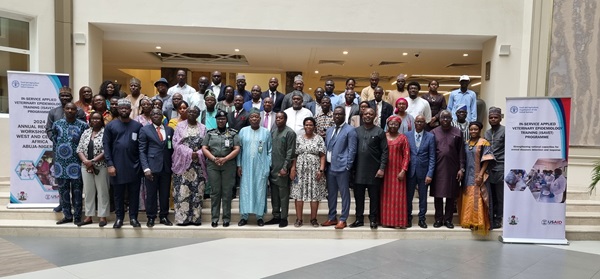
The Minister of State for Agriculture and Food Security, Dr. Aliyu Abdullahi has emphasised that the In-Service Applied Veterinary Epidemiology Training (ISAVET) programme will significantly strengthen animal health systems, ensuring food security and protecting public health.
Abdullahi made these remarks during the regional meeting for the Front-line In-Service Applied Veterinary Epidemiology (ISAVET) Programme in West and Central Africa, organised by the Food and Agriculture Organisation (FAO-ECTAD) in Abuja. The event brought together experts and participants from 13 West and Central African countries, along with representatives from ECCAS, ECOWAS, FAO, and USAID.
Speaking at the meeting, Abdullahi, represented by Dr. Musa Inuwa, highlighted the critical role of the ISAVET programme in implementing sustainable capacity-building measures in field epidemiology under the “One Health” approach. He explained that this programme is aligned with the ‘Renewed Hope’ agenda of President Tinubu’s administration, which positions agriculture as a key driver of economic development. “Strengthening veterinary services through training programs like ISAVET is crucial for ensuring the health and productivity of livestock, which in turn supports food security and economic stability,” Abdullahi stated.
The ISAVET programme, initiated by the FAO, is designed to build the capacity of field veterinarians and other animal health workers to detect, investigate and respond to animal disease outbreaks in real time. Abdullahi pointed out that the program’s alignment with the “One Health” approach fosters collaboration between animal, human and environmental health sectors, ensuring comprehensive disease prevention and control strategies.
Abdullahi revealed that in Nigeria alone, five cohorts comprising 156 participants—62 females and 94 males—have been trained under the ISAVET programme. These trained professionals are now skilled in responding swiftly to outbreaks, mitigating the risks of disease escalation, and protecting livestock, wildlife and human populations. “The programme has provided data-driven insights necessary for understanding the patterns, causes, and effects of animal diseases. Additionally, it has helped establish a robust epidemiological workforce that is critical for disease monitoring, outbreak investigation and data collection at the grassroots level,” he added, citing recent Anthrax outbreaks and the ongoing Hemorrhagic Septicemia outbreak in Taraba State as examples.
He further encouraged regional cooperation in veterinary epidemiology to address transboundary diseases such as highly pathogenic avian influenza, foot-and-mouth disease, and African Swine fever. Abdullahi urged West and Central African countries to invest in building the capacity of their veterinarians, emphasising that investing in animal health is an investment in the safety of food systems and the well-being of the people.
In his presentation, the FAO representative in Nigeria and ECOWAS, Mr. Dominique Kouacou, represented by Tofia Braimah, stressed the growing burden of emerging infectious diseases, transboundary animal diseases and zoonoses, which pose significant threats to human and animal health as well as food safety and security. He underscored the need for integrated strategies and policies for animal health workforce development to ensure timely and effective disease detection and response.
Kouacou also highlighted the substantial contributions of the ISAVET programme in improving veterinary field epidemiology capacity across West and Central Africa. He reiterated FAO’s commitment to supporting the region in building resilience against these threats.
The chief veterinary officer of Nigeria, Dr. Columba Vakuru, represented by Samuel Anzako, reported that collaboration and coordination with national veterinary services have strengthened epidemiology surveillance and disease reporting, significantly improving the “One Health” approach. Vakuru emphasised that the ISAVET programme will continue to provide a platform for collaboration across veterinary sectors and disciplines, further enhancing disease control efforts.
He pledged unwavering support and commitment to ISAVET in the fight against zoonotic and transboundary animal diseases across the African continent.
President of the Nigerian Veterinary Medical Association (NVMA), Dr. Arokoye Moses stressed that the ISAVET programme has a direct impact on saving human lives, not just animals. He noted that 2.5 billion cases of zoonotic diseases are reported globally each year, leading to 2.7 million deaths, underscoring the importance of the program. Moses encouraged participants to remain committed to ensuring the success of the ISAVET programme, which will bring positive change to West and Central Africa.

